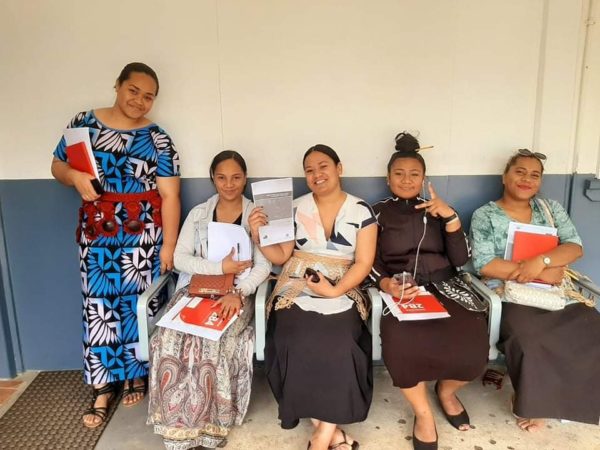“Growing up in a rural community [in Fiji], I have experienced the continually and visible impacts of climate change with sea level rising and coastal erosion along our coastal villages. This motivated me to become a climate change activist,” says Lucille Chute, who works as a Young Women focal point for the Shifting the Power Coalition and with Transcend Oceania in Fiji.
Amidst the escalating impacts of climate change in the Pacific, young women are taking action to shift the power and turn the climate crisis into climate justice.
The Young Women and Climate Change Project
The Young Women and Climate Change (YW&CC) project, supported by DFAT’s Australia Pacific Climate Partnership (ACPC), ActionAid Australia and the Shifting the Power Coalition, champions Pacific young women’s leadership by supporting them to engage in local and national disaster management and climate change policy advocacy.
By bringing together a feminist network of women, working together to tackle the climate crisis, the project has been able to support diverse young women from seven Pacific Island countries in becoming weather ready and climate smart. The project empowers young women to put forward locally led solutions to climate change and mobilises young women’s leadership to shift the power in disaster management in the Pacific.
Lucille highlighted why it is critical women are supported to lead climate change responses.
“Women are at the forefront during and post disaster. They are the ones picking up the pieces and providing the much need protection for their children, family, and community. That is why it is important that women voices and leadership be included in climate change advocacy because we are the first responders in our homes, our communities and our nation.”
Vika Savieti, a young woman based in Tonga with the Talitha Project says she became involved in the project to help “mobilise young women’s role in climate action…to increase disaster awareness and preparedness among young women as we approach cyclone season.”

Pacific young women in Tonga visiting the Tonga Meteorological Office.
Pacific Young Women leading Climate Action
As another global climate summit (COP26) ends, the Pacific cyclone season starts and the pandemic continues, the urgency of the climate crisis is only escalating. Wealthy countries have contributed the most to the climate crisis and become rich off the back of fossil fuels, while developing countries, who are least responsible for this crisis are bearing the brunt of the effects of climate change. Therefore, wealthy countries have a moral responsibility to listen to, and support, communities on the frontline of the climate crisis to adapt to its impacts.
“Work with Pacific young women to transform the climate crisis into climate justice. Young women are showing they are not the leaders of tomorrow because they are out their leading today.” says Carolyn Kitione, Regional Young Women Focal Point for the Shifting the Power Coalition, “we are telling you when systems are not working for us. We are telling you to work with us. If we want sustainability in our approaches, we need to start by ensuring there are a diversity of voices in the room where the decisions are being made on how to respond [to the climate crisis].”
As a young Fijian woman, Lucille says, “for us as young women in small island countries, climate justice means to end all activities that contribute to the damaging effects of climate change. It means mobilising together, it means bigger countries listening to us, engaging with us to find solutions to climate change.”
The message from Pacific young women is clear – climate action must include a diversity of voices, wealthy countries must listen to those who will be most affected and the time for action is now.
Learn more about ActionAid’s work on Climate Justice.
About the Shifting the Power Coalition
The Shifting the Power Coalition was established in 2016 and brings together the leadership, expertise and experiences of diverse Pacific women. Today, spanning a network of close to 100,000 grassroots, intergenerational and inclusive movements in seven Pacific Island Forum countries, it is the only women-led regional alliance focused on strengthening the collective power, influence and leadership of diverse Pacific women to respond to disasters and climate change.